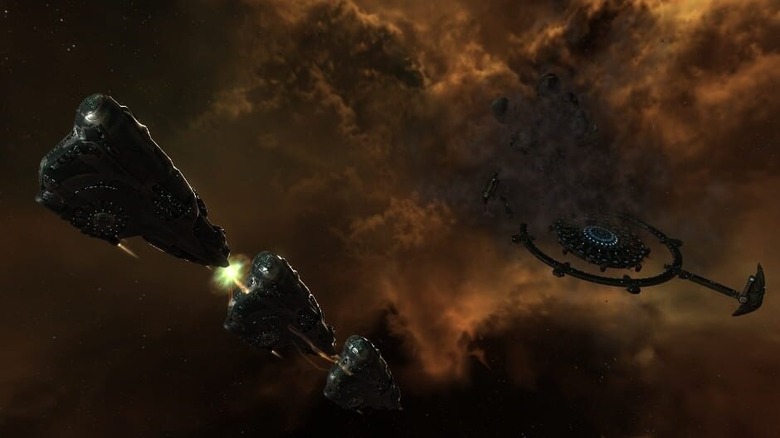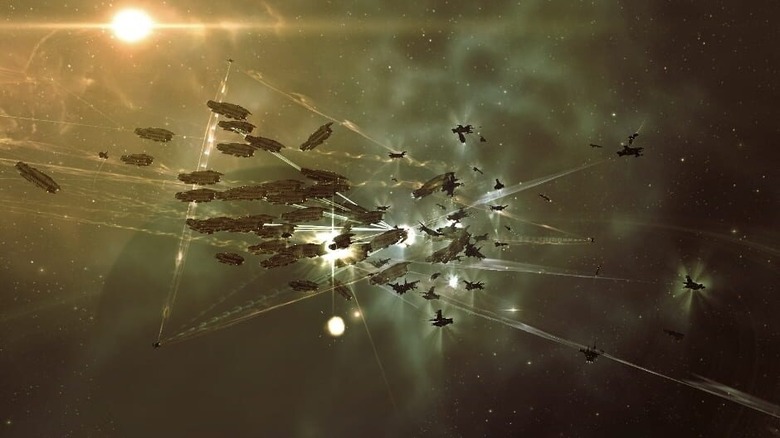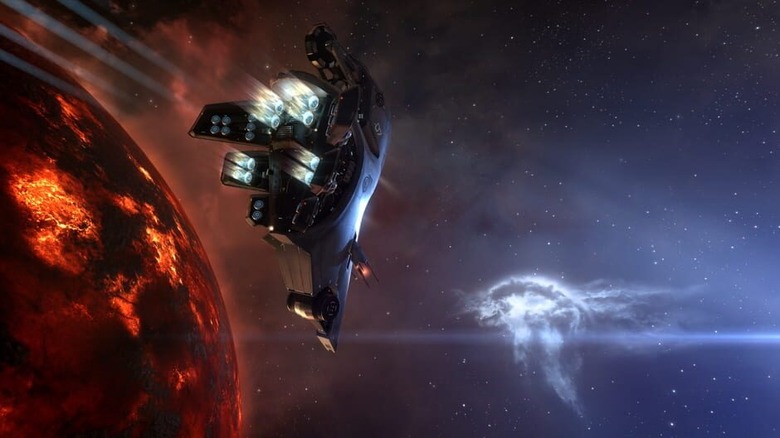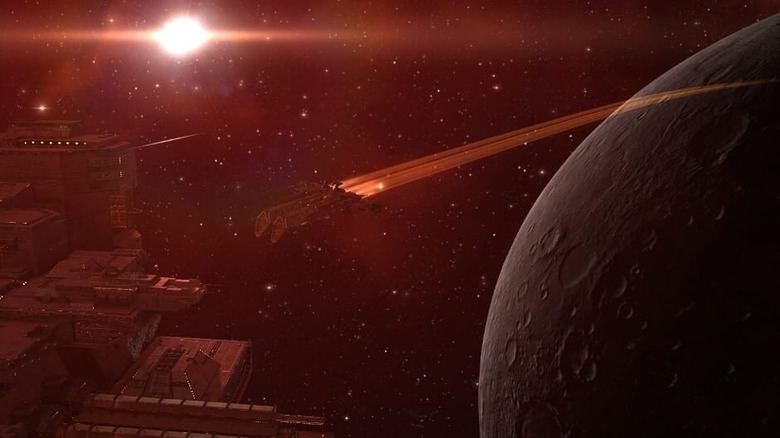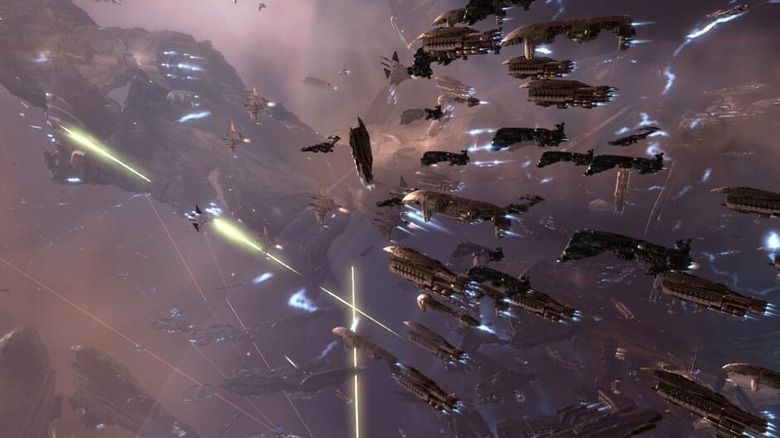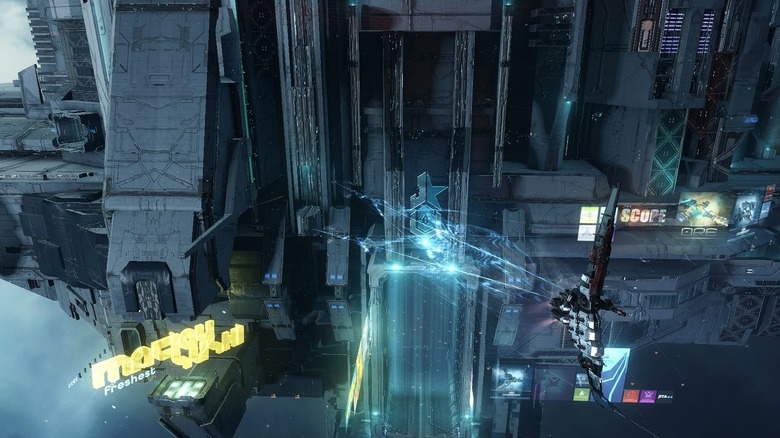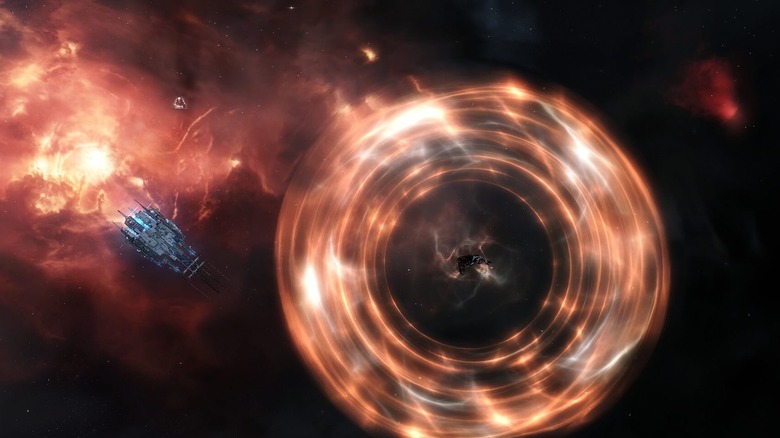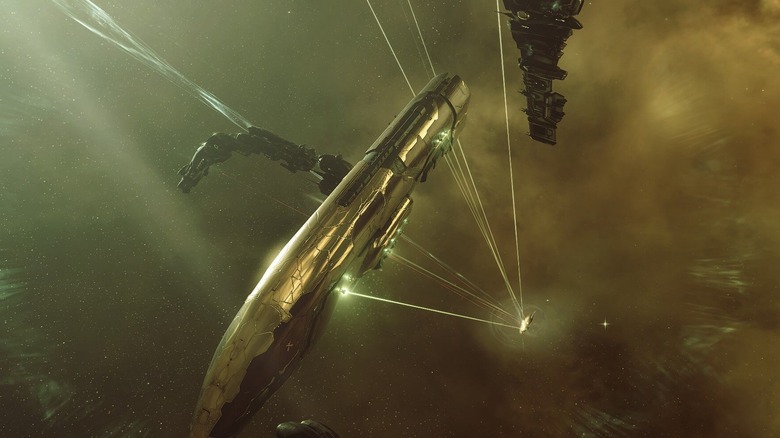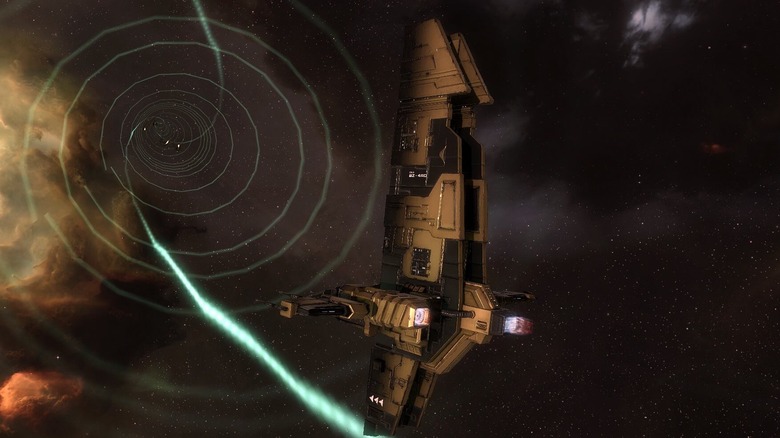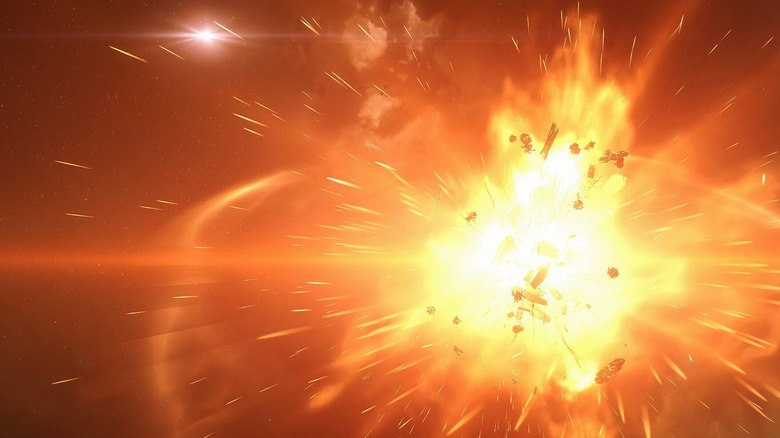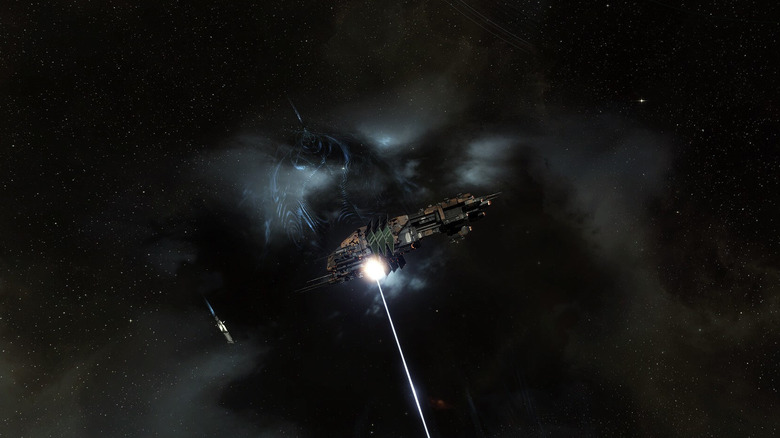The Shady Side Of EVE Online
"EVE Online" is known for its complex economics, global servers, and for being the MMO that designs-in many gameplay experiences that are traditionally considered taboo. Stealing from other players? Works in "EVE Online." How about infiltrating social guilds under false names to sabotage them or gain information? Works in "EVE Online." But what about scamming new players who naively trust people? Well, now you're starting to get the picture of "EVE Online."
There are few, if any, games that compare to the grand scope of the contiguous world server of "EVE Online." And, on top of that, there are even fewer games that can say they are as much of a "sandbox" as "EVE Online" is. Even academic researchers have taken keen interest in the game's economics, due to their analogous relationship to real-world economies (per The Wall Street Journal).
Every so often, "EVE Online" breaks headlines for having a global conflict that is destroying hundreds of thousands of USD worth of in-game resources due to some large-scale corporate rivalry. What goes into those epic, galaxy-spanning wars requires a trip to the darker underbelly of the beast. For players of "EVE Online," this article only scratches the surface of what you know to be an incredibly rich and storied history, and for those uninitiated, prepare to be surprised at what happens in the galaxy of New Eden.
Culture of Mistrust
What happens to a social order when the basic rules of contracts can be broken? What becomes of a people that routinely scam, con, and take advantage of each other? Well, "EVE Online" has that answer: the society becomes ruthless and tribal, and the people develop a deep culture of mistrust.
Many gamers are familiar with the "Noob Forest" from "RuneScape"–a place where new, naïve players would be taken advantage of by veteran players. There, the new players were lured into a PvP zone where they could be slain and looted without penalty. "EVE Online" is basically the noob forest of "RuneScape," but expanded to the entire galaxy.
Betrayal, theft, and fraud are all coded-in possibilities within "EVE Online." By extension, deceiving others for one's benefit is core to the gameplay. CCP Games, the developers and producers of "EVE Online," even included that info in its Reimbursement Policy, explaining that "assets lost to a scam may only be reimbursed if the scammer used a verified bug to hide his intentions to scam. Generally in-game scams are allowed and considered a valid tactic as long as they are done via normal game mechanics. Players are cautioned to use their best judgment when entering into agreements with other players."
Scamming as a valid tactic has led to many elaborate heists and false relationships over the years. In general, however, this attitude towards gameplay has engendered a basic agreed upon motto between players: "Don't trust anyone."
Massive Time Investments Blown to Smithereens
Most MMO's allow players to make mistakes but still retain all the progress they've invested into the game. "EVE Online" is the exact opposite of that. When a ship is blown up in "EVE Online," it's blown up for good. The resources, money, and all the time that went into building that now-destroyed ship are not refunded. Only the salvage remains, and that goes to the victor.
Consequently, the stakes of "EVE Online" are extremely high since dying is so punishing. Player versus player combat in "EVE Online" is unique in this regard: players will leverage all of their economic, political, and social resources in winner-takes-all deathmatches. And, when all those in-game hours have added up and the player feels deserved ownership over their possessions, then dying in "EVE Online" can be demoralizing like no other video game death, as Steven Messner explained for PCGamer.
Paired with the game's cutthroat nature, this high-stakes environment has led to many players quitting the game once their time investments are reduced to null. One testimony from "The Dark Side of Gameplay" said that, "One particular player begged and pleaded not be destroyed, he willfully transferred everything he owned, wallet, assets, and all, to keep his ship alive. He warped back to the mission only to see us blow his ship up, and collect the salvage and valuable modules. He never logged back in." This is the darker side of the double-edged nature of high-stakes gameplay — it demands players to be more invested and immersed in their gameplay while also enforcing the cost of absolutely crushing defeats.
Espionage is Everywhere
In the cutthroat world of "EVE Online," strong allies are imperative for survival. Drifting through New Eden, the galaxy of "EVE Online," as a loner is a tough gig, generally relegated to freelance resource mining on the outer rims of space.
As a result, corporations, or player-made guilds, fill the space of security and power projection across the geography of New Eden. These organizations can take many forms, but the most powerful take on a neo-feudal approach with consolidated power amongst the higher-ups. They, then, utilize their security promises to weaker players for a working class to carry out their domain's labor and supply the manpower for wars.
These organizations are complex. The distribution of power and knowledge is a delicate balance, mainly because spying is such a powerful profession in "EVE Online." Back in the game's early days, one spy in particular, called The Mittani, forged one of the strongest and longest lasting corporate empires on the back of his espionage skills.
To say that being a corporate spy in "EVE Online" takes a lot of dedication is an understatement. The lengths that some of the game's most dedicated, and therefore, most successful, spies go to can last upwards of years in some cases (via PCGamer). "Don't trust anyone," is the default motto of players, due primarily to this element of subterfuge. Even when players band together to give each other more security, there's always the chance that one of them is a traitor — an imposter among us.
Blurred Lines
The rampant culture of mistrust in "EVE Online" didn't always exist. In the early and mid 2000s, espionage wasn't nearly as widespread and accepted as it is today. A major reason why the game has pushed so far towards cutthroat espionage is the successes of The Mittani and his corporation, Goonswarm (now known as the Imperium).
The GIA, or Goonswarm Intelligence Agency, is responsible for many of the game's storied exploits. For example, there was a conflict between Goonswarm and another corporation named Lotka Volterra, who were short of a spying department themselves. So, they turned to the mercenary spy market and contracted a person named Kugutsuman, who had cyber security skills. Kugutsuman provided access to the Goonswarm forums and even the email account of Goonswarm's CEO to the leadership of Lotka Volterra.
It turns out that Goonswarm already had a spy in Lotka Volterra at the director rank, so they learned of their forums being hacked by Lotka Volterra's higher ups, sharing their newly obtained information. This allowed Goonswarm to lead Kugutsuman astray with red herrings while planning a counter-offensive. In the meantime, Lotka Volterra proceeded to not pay Kugutsuman his contract's dues, and he proceeded to flip sides and then gave Goonswarm access to all of Lotka Volterra's forums.
Whether or not the forums and emails were hacked was never fully confirmed, but surely, the line between gameplay and real-life attacks was blurred (and most likely crossed) by both sides in this installment of "EVE Online" history.
Space Corporations are just as political as real ones
One of the most eventful times in the history of "EVE Online" was the transfer of space hegemon from the Band of Brothers (BoB) to Goonswarm. BoB had been the dominant space corporation from the earliest days of large-scale conflict, and their eventual downfall would come at the hands of one disgruntled director. This BoB director, Haargoth Agamar, knowingly entered into a relationship with a Goonswarm scammer on his alt account. He liked Goonswarm's culture compared to the lack of respect and bad vibes at BoB so much that he revealed his identity and offered to flip his allegiance to Goonswarm. This turncoat event, due to a lack of ideological synergy, ended BoB and allowed Goonswarm to assume the reign of space king.
However, Goonswarm themselves are not immune to internal and external politics. Their long time leader, The Mittani, recently stepped down in 2022 amidst a slew of allegations about abuse and mismanagement. According to PC Gamer, the allegations are numerous and complex, but the main ones point towards management that was dismissive of internal abuses as well as knowingly keeping a person in a position of power when they had been accused of being associated with child pornography a decade earlier. The Mittani has denied the allegations in a forum post, and has asked for more privacy for him and his partner in stepping down while also asking that Goonswarm and the rest of the galaxy stop using him as a scapegoat (via Imperium News Network).
Space Tax Havens protect the rich, just like the real world
Most people are familiar with the Cayman Islands, Virgin Islands, and Bermuda as international tax havens. These serve the function of protecting large sums of wealth from the taxation laws of the jurisdiction that the capital was produced in, effectively allowing rich and powerful people to park their wealth in no-tax environments.
The market economics of "EVE Online" is robust enough that a similar system to international tax havens emerged in the digital economy. Trade hubs are places in "EVE Online" where trade is facilitated through the in-game currency, ISK. And, of course, "EVE Online" is a game centered around gathering, price speculation, and the transaction of resources so millions of transactions in ISK happen at these trade hubs every day.
But, "EVE Online" allows players to set up trade hubs of their own that can be self-regulated in terms of ISK tax rates. According to this How Money Works video, players from all over the galaxy set up trade hubs during a race-to-the-bottom event where trade hubs across the galaxy went to 0% ISK tax rates and became unsustainable, thus leaving behind empty trade hubs all over the place.
However, a few trade hubs survived and thrived during this chaos–those that were well-protected and well-placed. The rights to trade at these trade hubs came through political allegiances, so only the most prominent corporations now control cheap-tax trade havens.
Space Corruption is enabled by real-world corruption
A consequence of creating a game played by chart wizards and real-world cybersecurity experts is that hiding bugs, exploits, and important information from them is a tricky thing to do. In fact, CCP Games does not have a spotless record when it comes to its own employees playing the game, and the only reason this story broke headlines in 2007 is because the cybersecurity expert named earlier in this article, Kugutsuman, revealed what a CCP Games employee had been up to.
Named T20 in-game, this CCP Games employee was part of the Band of Brothers alliance, the first large PvP corporation in the game, and abused his power by spawning in rare and valuable items for the Band of Brothers. Trust in CCP Games was further been shook when they censored criticism about T20 in-game and in the forums after claiming that he was merely trying to bug-fix (per Shadow MMO).
In an attempt to right this wrong, CCP Games instituted the Council of Stellar Management (CSM), a democratically-elected representative body that would work alongside the game studio to provide closer feedback while providing transparency for the community. While it may be a damned-if-you-do, damned-if-you-don't solution for CCP Games, it didn't bode well for the confidence of their community that had already been shaken to its core.
Gambling-funded World Wars
Back in 2016, a war broke out between The Imperium (Goonswarm) and a mercenary fleet from across the galaxy that was funded by casino money. That's right. An entire world war, named World War Bee, or The Casino War, was perpetuated by the insane profits of one space casino higher-up.
The casino, called I Want ISK (ISK being the in-game currency), was a place where players could compete against the house in games of chance like slots as well as participate in raffle-type events. I Want ISK became an incredibly lucrative in-game business and one of its senior bankers, Lenny Kravitz2, spent little time putting that newfound ISK to use.
The ISK was funneled directly into the war campaign efforts of two of the game's most prominent mercenary groups. The conflict came to an abrupt end, however, when CCP Games banned the use of in-game currency for gambling purposes. They claimed that ISK was being converted to USD illegally, and they had to shut down the gambling houses for liability reasons while simultaneously seizing over $600,000 worth of in-game currency (roughly 40 trillion ISK), according to Polygon.
The makers of EVE Online don't run a tight ship themselves
Working as part of a team is one of the great joys of "EVE Online." Buying into something larger than oneself can lead to some truly awe-inspiring collective action, and "EVE Online" is no stranger to creating epic, community-driven moments. The glue that holds organizations together in "EVE Online" is survival. And if one Reddit post from an alleged ex-member of the CSM, written in 2022, is to be believed, then survival was also the name of the game at work as well.
The poster alleged that CSM had a toxic, unfocused work setting that, in total, was, "worse than you know." They drew attention to a culture that often talked over women, and pointed to money and data mismanagement related to skin sales. They also alleged that CCP shows favoritism to the members of the Council of Stellar Management that are not critical of the game or the studio.
Coming soon after the dissolution date of an NDA, it does seem like this poster was waiting to get this information off their chest. And while none of these accusations have been meaningfully substantiated, other commenters on the Reddit thread with some from other ex-members of the CSM, agreed with the sentiments of the original poster (per MassivelyOP).
Digital Space allows for insurance fraud
In a world like New Eden, where one's worth is tied to cold-hard-ISK and there are no rules or regulations for acquired said-ISK, why wouldn't there be space fraud? Back in 2012, the Inferno expansion added in a feature where players were rewarded with LP points (another in-game currency) whenever they blew up an enemy spaceship based on the value of the ship and the cargo. The formula for this accidentally included parts that would survive, opening up a loophole that allowed for massive profits.
According to this forum post, savvy players took to finding the worst ships of their fleets, filling them up spare parts, all while starting fake wars to trade kills with other allies in on the gig. However, right before the ships were detonated, they would perform market manipulation on whatever spare part they had filled the ship with, driving the market-price of their junk up momentarily. The LP claim would snapshot the value of the goods on deck and the ship parts when it blew up, so these junker ships filled with garbage ended up paying out massive LP claims to their attackers, effectively creating and exploiting an insurance market simultaneously. Before CCP patched up this exploit, players were able to generate more than $175,000 USD worth of in-game credits.
Anime-based Warfare
"EVE Online" isn't exactly a forgiving game. In fact, it's quite literally the opposite of that — it's unforgiving to its core, both in its gameplay and its hardened community. Matters of resource domination, cultural hegemony, and diplomatic espionage might be what one would guess is at the center of the grand-scale conflicts of "EVE Online." And, for the most part, they would be right.
However, not all conflicts begin on such legitimate terms. A conflict in 2017, that would come the be known as World War Weeb, was initiated on the basis of anime memes being spammed too much in a corporate Discord. The corporation, WAFFLES, had been using a messaging app without picture support, and when they switched to Discord they learned that many of their members were anime-lovers that constantly posted anime-memes.
This led to the leader of WAFFLES instituting a ban on anime posts in the Discord, which started a rift within the community, and specifically with one member of the CSM, Jin'taan. Jin'taan started a beef with WAFFLES leader, and when it came out that Jin'taan loved anime himself, then WAFFLES used that as justification to start an invasion. And while this meme war lasted about as long as its weeks-long run up to it, there is a still-alive Discord server for the anime-loving exiles from the war.


